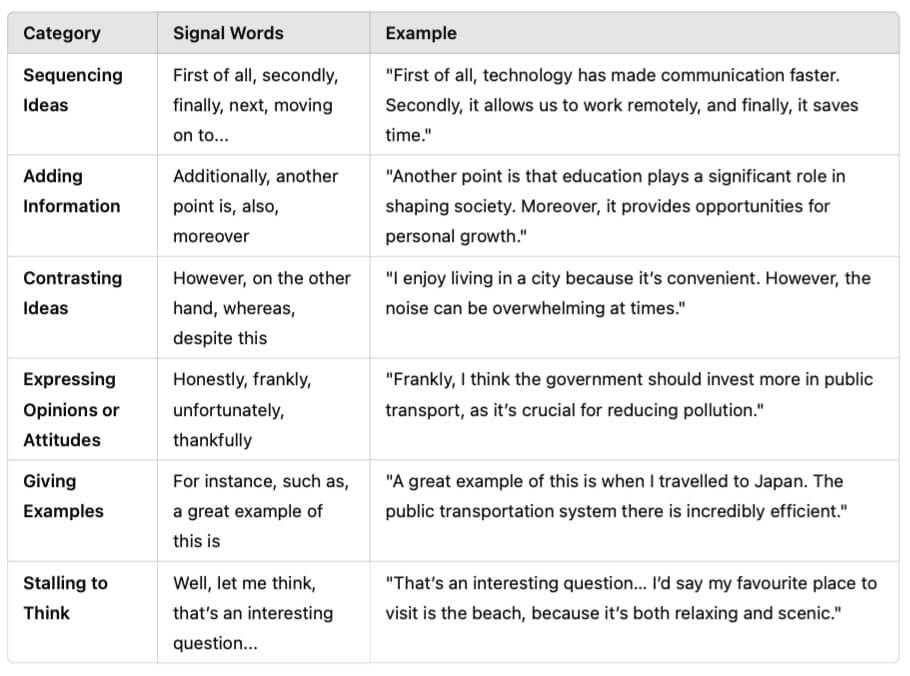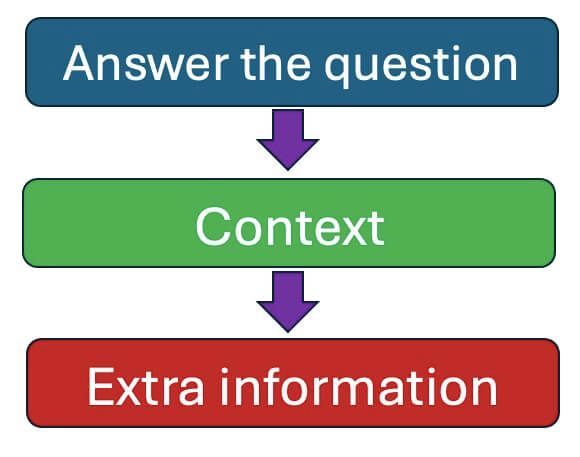- Home
- Speaking Lessons
- Personal Experiences
Speaking about Personal Experiences in Part 3
This lesson is about using personal experiences in Part 3 of the IELTS Speaking Test
Students often make a mistake in part 3 of the IELTS test as they talk only about their personal experiences. This is usually the sign of a weaker candidate.
Parts 1 and 2 of the speaking test are very much about YOU.
- In Part 1, they ask questions about anything from your studies to your favourite types of clothes.
- In Part 2, you have to talk for two minutes about such things as a place you've been to or someone you know.
- However, Part 3 is not so much about you. It is about topics more generally, and how they affect everyone, rather than just you personally.
Here are some example questions from part 3 of the speaking test on a variety of topics:
Part 3 Example Questions
Food:
- Describe the type of food that people eat in your country
- How are the eating habits now in your country different with those in the past?
- How healthy is your country's food?
Education:
- What do you think about the way languages are taught in schools in your country?
- How do you think a poor university education can affect career success?
- What changes do you think will happen in the classroom in the near future?
Leisure:
- Why are some activities more popular than others?
- How do the types of leisure activities popular now differ from those popular when your parents were young?
- What types of leisure activities may become more popular in the future?
If you look carefully at the questions, you will see that they are not about YOU, they are about people generally in your country or around the world.
A common mistake for some students is that they make the topic only, or mostly, about themselves or people they know rather than talking more generally.
Examples of Good and Bad Answers
Here are examples of good and bad answers to two of the above questions. What is wrong with the 'bad' answers?
Example 1
Describe the type of food that people eat in your country.
Bad answer:
I might try some other dishes occasionally, such as Korean food as I like that, but I always tend to eat Japanese food. At home my mum will always make Japanese food too. My brother will eat much more western food than I do, but he will go out to buy this rather than getting it at home.
Good answer:
There are a lot of different types of food in Japan if you are in big cities like Tokyo, such fast food outlets, Italian restaurants, Korean food, and of course a lot of Japanese restaurants. But most local people tend to eat Japanese food, even in these big cities when there are other choices, but especially in smaller towns and villages.
Example 2
What do you think about the way languages are taught in schools in your country?
Bad answer:
In my school we learned English and it was taught really badly. I think it's firstly because the teachers themselves were not native English people, and their English was not perfect. So they taught us to say some things incorrectly, and also they could not always say things clearly so we could not learn good pronunciation off them.
Good answer:
In most schools in my country, English is the main language taught. I think it is actually taught quite badly because many of the teachers are not native English teachers. A good example is at my school. The teachers themselves were nearly all Korean, not native English people, and their English was not perfect. So they taught us to say some things incorrectly, and also they could not always say things clearly so we could not learn good pronunciation off them.
As you will have noticed, in the bad answers, the candidate just speaks about their personal experience and nothing general. In the good answer, the candidate talks about society in general.
However, this does not mean that you cannot refer to your own experiences, but this should be done to illustrate your general response in order to further explain what you mean.
You can see an example of this in the good response about education. Notice how the candidate starts with a general answer but then explains it further with their own experience (in red):
In most schools in my country, English is the main language taught. I think it is actually taught quite badly because many of the teachers are not native English teachers. A good example is at my school. The teachers themselves were nearly all Korean, not native English people, and their English was not perfect. So they taught us to say some things incorrectly, and also they could not always say things clearly so we could not learn good pronunciation off them.
So it is ok to talk about your own experiences, but these should just support your general ideas about society – the whole answer should not just be about your experience.
Here are some more examples of some good answers that are supported with personal experience (in red):
More Examples of Good Answers
How do you think a poor university education can affect career success?
I don't think that is does have to affect it because many people manage to become successful without a higher education. It is more down to your confidence and motivation than anything else. For example, I've got two brothers. The older one went to university, but the most successful of the two is actually my younger brother who started working straight after school. He is now the head of one of the biggest companies in Italy, and this was down to his drive and enthusiasm for his work and his ability to get on with people well.
How healthy is your country's food?
It's not really that healthy I would say. A lot of Thai food is cooked in fat and oil, especially the street food which is often cooked in fat that is reused many times. MSG is also added a lot. Also, there are now a lot of fast food restaurants that people eat at because it is convenient. My younger cousin already has diabetes and he is only 23 and I'm sure that is due to diet. And my father has a bad heart which is from too much cholesterol which I think has also been caused by the food.
So to sum up, in part 3 of the speaking, make sure that you are talking generally rather than about personal experiences.
However, you can use personal experiences, but these should just be used to illustrate your general points.
Comments
Any comments or questions about this page or about IELTS? Post them here. Your email will not be published or shared.
Band 7+ eBooks
"I think these eBooks are FANTASTIC!!! I know that's not academic language, but it's the truth!"
Linda, from Italy, Scored Band 7.5















